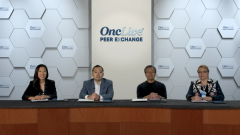
Goals of Therapy for Acute GVHD Treatment
Hannah Choe, MD, discusses triggers to initiate acute GVHD therapy and goals of treatment.
Episodes in this series

Yi-Bin Chen, MD: Let’s transition to talking a little about how we treat acute graft-vs-host disease [GVHD]. Hannah, when you see a patient who hypothetically presents with a couple of days of new-onset diarrhea, around day 30 after transplant, and your suspicion is it’s lower GI [gastrointestinal] acute GVHD, what’s that conversation like in terms of explaining the goals of therapy and expectations for that patient?
Hannah Choe, MD: When we first see a patient with lower-GI GVHD, there’s a lot of urgency associated with it, depending on the severity of the diarrhea. That’s because the GI tract can be a main driver. It’s an initial starting point as a target organ for T-cell activation and progression of the graft-vs-host disease. When you’re talking about a GI-tract initial presentation, rather than skin graft-vs-host disease, there’s more urgency to potentially starting systemic therapy.
First, the patient will be evaluated for further work-up, whether or not they should be admitted. At my institution [Ohio State University Comprehensive Cancer Center], we tend to be aggressive about getting biopsies. We’ll admit the patient to have a flexible sigmoidoscopy done more urgently and then decide whether it’s worth it to start steroids even before biopsy.
The initial treatment planning begins with the availability of clinical trials. Any patient who comes for new diagnosis of GVHD sends out an alert among our group saying, “There’s concern, let’s collect biomarkers and determine whether they may be eligible, depending on their risk,” whether that’s Minnesota or Ann Arbor or a combination for a clinical trial, such as BMT CTN 1705, which is looking at alpha-1 antitrypsin plus steroids vs placebo plus steroids. If they’re eligible for clinical trial, they’ll be monitored on a clinical trial. If they’re not eligible for a clinical trial and proceed on standard prednisone therapy, then we’ll watch to see if they’re steroid refractory. Oftentimes, a patient with GI GVHD will remain inpatient until symptom response is evaluated.
Transcript Edited for Clarity
































